Advertisement
Lessons learned while foraging: Take some, leave some for the next time around
Resume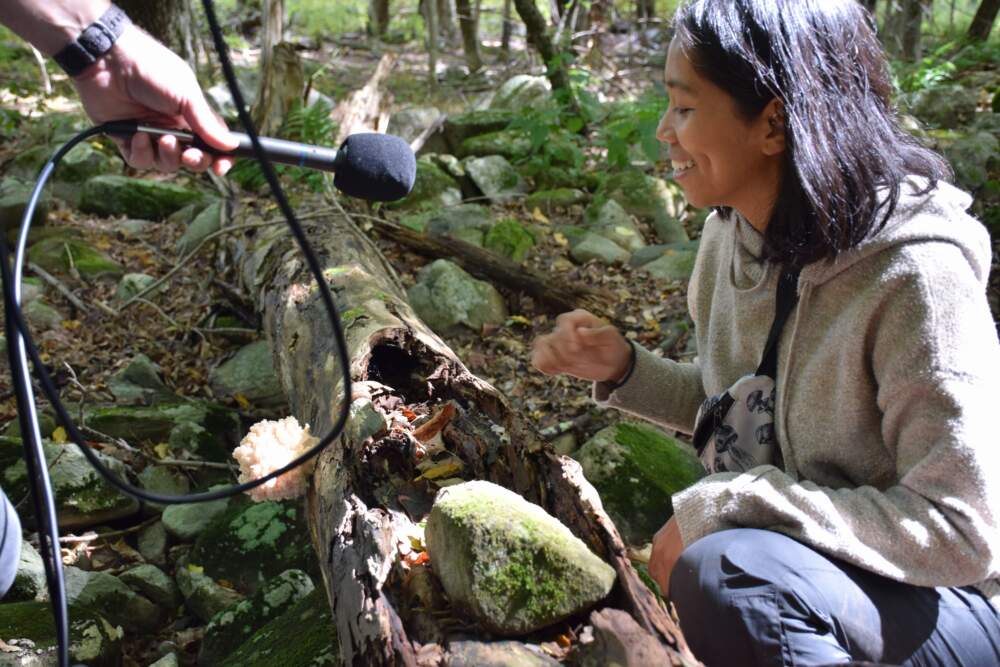
"To me, foraging is like something that nature, Mother Nature, can give to you if they allow you to find it," says Ria Ibrahim Taylor, who gained quite a social media following during the pandemic for posting her foraging finds from her home base of Albany, New York. For Ria, foraging isn't a hobby she picked up recently, but a way of life while growing up in rural Indonesia. By posting her expertise on social media, she hopes others can rethink their relationship to food and the land they they live on.
In this episode of Endless Thread, co-hosts Ben Brock Johnson, Amory Sivertson, and producer Megan Cattel set out on a day of foraging with Ria as their guide in upstate New York. Over the course of the afternoon, they learned about the do's and don'ts of foraging sustainably at Ria's workplace, Soul Fire Farm. We also delve into how foraging became wildly popular during the pandemic, and the best practices for finding goods in the woods.
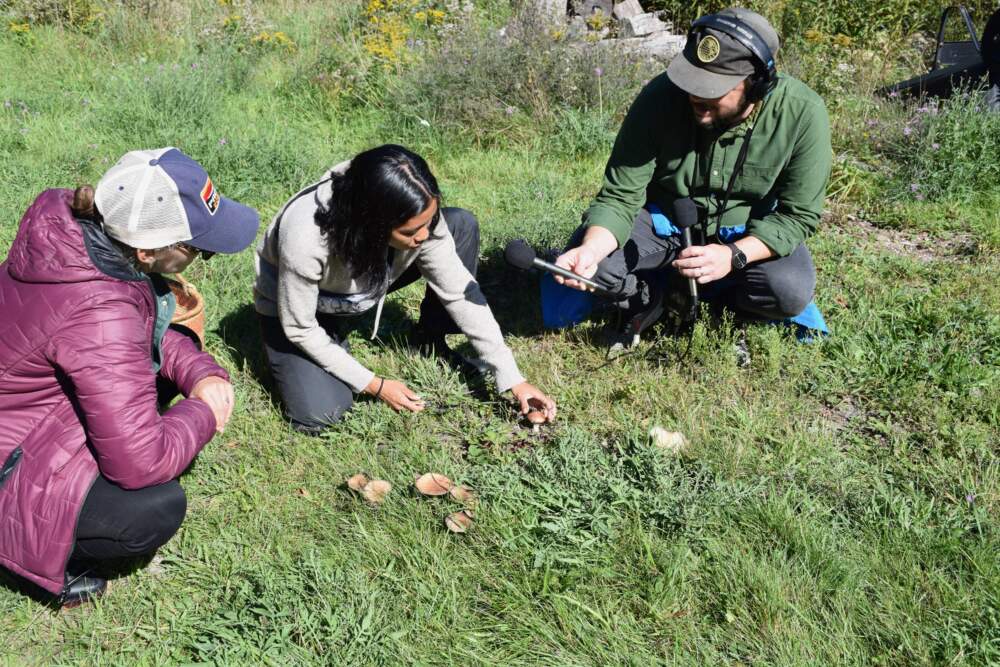
Show notes
- About Soul Fire Farm
- About Community Supported Agriculture
- Ria Ibrahim Taylor's Instagram and Twitter
- Foraging subreddit
- "Ditch your grocery store. Go foraging instead." (The Washington Post)
Support the show:
We love making Endless Thread, and we want to be able to keep making it far into the future. If you want that too, we would deeply appreciate your contribution to our work in any amount. Everyone who makes a monthly donation will get access to exclusive bonus content. Click here for the donation page. Thank you!
Full Transcript:
This content was originally created for audio. The transcript has been edited from our original script for clarity. Heads up that some elements (i.e. music, sound effects, tone) are harder to translate to text.
Ben Brock Johnson: It’s the end of the summer in 2022 and Amory and I are out in the woods again, baby. Makin’ mischief.
Amory Siverton: Even a “no trespassing” sign, that's never stopped us before.
Ben: That's true.
Amory: For better or worse.
Amory: But we’re not alone. Our colleague and producer producer Megan Cattel is leading us through the tall grass surrounding a house just off a road in upstate New York that looks … a little creepy.
Megan Cattel: We're trying to find the entrance.
Ben: Yeah, this is … I'm going to say this is not the place we're going for.
Megan: Maybe they can tell us where to go?
Ben: Pretty sure it's down the hill.
Amory: Okay.
Ben: I think that's a security light.
Megan: Oh, okay!
Amory: Megan is helping us search for a treasure in the woods …
Ben: Which, as I was saying, was down the hill.
Amory: All right, it was down the hill.
Ben: Down the hill on a dirt road we found a big, empty dirt parking lot with a guy in it driving some heavy equipment. And he was gonna help us get to our treasure in the woods. A treasure of a human, named Ria.
Ben: How are you doing?
Kirk: Good.
Ben: We're looking for Ria.
Kirk: Ria?
Ben: Yeah.
Kirk: Straight back on the farm.
Ben: Okay, cool.
Kirk: Straight back and on the right.
Megan: On the right.
Kirk: She is ... she is something.
Amory: Yeah?
Kirk: Yeah, Just walks into the woods and comes back with —
Ben: Have you ever benefited from her finds?
Kirk: Ah, I think she made me some couple different drinks. Yes. So I would say yes.
Ben: Cool.
Amory: Like a mushroom drink?
Kirk: Couldn't tell ya.
Amory: (Laughs.) She gave it to me. I drank it!
Megan: Juicy, juicy juice?
Kirk: Could've been!
Amory: What's your name?
Kirk: Kirk.
Amory: Kirk.
Kirk: Yeah.
Amory: Well, thanks for talking to us.
Kirk: Sure, sure.
Amory: We're just here for the day, and then we'll get out of your way.
Kirk: Well, enjoy.
Ben: Thank you very much.
Amory: Thank you!
Kirk: You're welcome. Have a good rest of your day for me.
Amory: I will. Okay. Well, tell her. She will tell her. Kirk told us to make us a drink.
Kirk: There we go. (Laughs.)
Ben: So tell me everything that you know, Megan.
Megan: So I first found Ria during the pandemic. It was 2020. Couldn't leave my house.
Ben: Mm hmm.
Megan: And I was getting recommended. These tweets of these gorgeous harvests of this person named Ria on Twitter who was like, I just found, like, this ten pound chicken of the woods. Mushroom and chicken of the woods is giant mushroom, and people fry it and it tastes like chicken.
Ben: Can confirm it tastes like chicken!
Amory: Can’t confirm chicken flavor but can confirm delicious flavor. And we are about to learn a lot more from Ria. Who is like, standing on the crest of a hill waving to us through the sunlight like some kind of religious saint or disney princess? And greeting us with hugs.
Megan: Hi!
Ben: Hi.
Amory: I love your fanny pack. Very appropriate.
Ben: Hi, nice to meet you.
Amory: Thanks for having us.
Megan: Yeah.
Ria Ibrahim Taylor: Yeah. All ready for being in the forest?
Ben: I think so!
Ben: We are ready. But before traipsing into the forest we got a view of a small circle of beautiful cabins, and a sprawling garden that spills down a long south-facing hill.
Ben: I love your, like, your fields here.
Ria: Yeah this is a —
Ben: And your hoop houses.
Ria: Soul Fire Farm. We're a nonprofit organization for, like, food justice and end of racism.
Amory: Soul Fire Farm’s mission, among other things, is quote “uprooting racism and seeding sovereignty in the food system.”
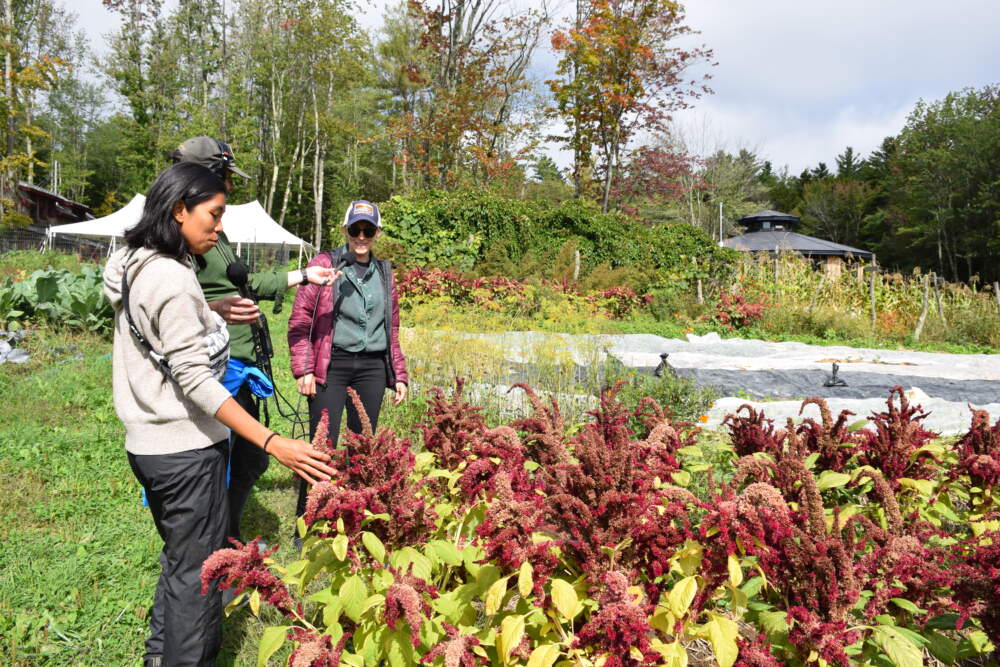
Ben: Long, hand-planted rows of napa cabbage, green onions and daikon, planted largely by farmers of color, will be turned into kimchi and delivered for free to people in Albany and Troy, New York. Ria, who is from Indonesia, is part of this program.
Amory: You’ve probably heard of farm shares, or Community Supported Agriculture, CSAs that you can pay into to get some of the fruit of the land. Well this is called a "solidarity share."
Ria: We have like, I think 25 households and then there is many like at a community, [and] Free Food Fridge Albany.
Ben: I was in Hudson recently at a restaurant and there was a refrigerator.
Ria: Yeah, yeah.
Ben: With like a bunch of food in it for people to take if they wanted to. So is that that kind of thing?
Ria: Yes. Yes, I think, I think it's, it's like that. So we always have extra, especially this time of year we harvest a lot of food and, and we just like learn and how to invite the community and cook make kimchi to get in this kitchen. And then we deliver the kimchi to people like who need it for their long. Yeah, winter probiotic, probiotic food. So this is part of my job.
Ben: This is very cool but it’s not really why we’re here to meet Ria. We came here to find a treasure of a human in the woods who is going to teach us about finding treasure in the woods. Specifically, mushroom treasure. Which is part of a huge explosion of foraging that has been happening in the U.S. in recent years.
Amory: It got a real boost during the pandemic. And it’s still going strong. It’s also part of a palpable and growing interest among younger generations to get back to the land, baby!
Ben: Today, a glimpse of the foraging movement online and off the beaten path.
Amory: And a glimpse of maybe some treasure in the woods? Something delicious? Like oyster mushrooms?
Ria: The one that like grow in the wild has a taste like has umami fruity sweetness to it and like when you caramelize it it just so good especially if you feel ...
Amory: I never thought my mouth would water from a mushroom.
Ria: Yeah! I love making like oyster banh mi sandwich.
Ben: Ooh!
Ria: Oh my God it's so good!
Ben: Amory is very excited. Yeah.
Amory: Yeah.
Ben: We should go foraging.
Amory: Yeah! Yeah. I was going to say ...
Ben: Like, I'm hungry. Let's go!
Amory: No, I just. I have so many questions, but I feel like you can ask them along the way, so.
Ria: Yes. Yeah.
Amory: Into the woods!
Ben: Amory heard oyster mushroom banh mi and she ran into the woods, just ran into the woods and never saw her again after that.
Amory: She died happy among the mushrooms.
Ben: I’m Ben Brock Johnson and nobody is gonna die among the mushrooms. As long as you follow the safety guidelines!
Amory: I’m Amory Sivertson and you are listening to Endless Thread. We’re coming to you from a lush forest in Upstate New York for WBUR, Boston’s NPR Station.
Ben: Today’s episode: Treasure in the Woods!
Amory: So when our producer Megan discovered Ria during the height of the pandemic, it was through Ria’s Twitter and Instagram profiles, full of videos of how to pickle all kinds of things that could last through the winter. It was, well, organic.
Megan: And I'm like, "Wow, this is amazing. You know, I. And people were commenting things like, I want to learn how to do that. I want to, like, forage too."
Ben: But Megan was part of a huge trend. Remember cottage core Amory?
Amory: Oh yeah, all those puffy dresses advertised to me on Instagram? Milkmaid vibes? Escapism? I think Soul Fire Farm is more cabin core but what do I know?
Ben: Well, it’s all part of this return to nature trend among younger generations. And it’s been happening for years now. When Megan was watching Ria pickle things in 2021, the Tik Tok hashtag "foraging" had about 15 million views. Two years later it has ten times that many views. One hundred and fifty million. And it’s intersecting with rising trends in veganism and a renewed interest in farming and reconnecting with natural spaces.
Amory: I don't love this turn of phrase but I love that for humanity.
Ben: Samesies. And there’s this horde of foraging influencers growing on instagram tik tok etc. The foraging subreddit has 600 thousand users right now. It’s in the top one percent of communities on the site.
Amory: And part of the reason there’s so much content about this, is that there’s a lot learn about foraging mushrooms and other plants. Which is why we’re going out into the woods with someone who knows what they’re doing.
Ben: Also, someone who has a very particular approach.
Ria: To me, foraging is like something that nature, Mother Nature, can give to you if they allow you to find it.
Ben: Ooh, I like that.
Amory: That's good!
Ria came to the U.S. from Indonesia in 2017.
Ria: So I grew up in a village, a very, very rural village where everyone grow their own food, My family is fishermen and then my mom is a herbalist.
Amory: Ah!
Ria: So she grow medicine and also grow her own food. But my community, like our community, rely on my father to like for fish and the other my other neighbor, like, do like vegetable So I grew up in this kind of environment, but we don't call it as a work. It's just something that we do.
Ben: According to Ria, her village was so small that there really wasn’t such a thing as a 9-to-5 job there. Your work was literally gathering food to stay alive. Want to eat chicken for dinner tomorrow? You better kill one of your chickens today and start gathering herbs and making a fire. She says there’s not even really an equivalent word for "foraging" in her language.
Amory: The first time Ria saw television, she says, was when she was when she was a senior in high school. And got a sense of the global world.
Ria: And I was like, I don't want to leave like this. Like my father, my mom, like being the soil. I want to work in the office, air conditioning and like high heels and all of those thing. Like, you know, like what I see.
Ben: She moved 12 hours away from her family’s village. Got an office job. High heels. Meetings. She studied international relations and soft diplomacy. She worked for the U.N.
Ria: I was like. I was like, feeling happy but not happy. I was like, okay, this is what my life goal already. Like, I look smart. But I'm not happy! And I was like, I miss my little village where I don't have to wake up like 6 AM and dealing with a lot of meetings and stuff.
Amory: The city felt weird to Ria. Even the supermarkets were strange. A bunch of chicken breasts all in one package, separated from the feet, the heart, and the liver?
Ria: I walk in this supermarket and I'll say, oh my God! Look at this meat. It looks like a bookshelf, like books in a bookshop, right? I’ve never seen it in my life.
Ben: But before Ria headed back home, her life took another big turn. She got into a relationship that brought her from Indonesia to outside of Albany, New York. Where it was cold. Also, her relationship ended. She didn’t know anyone in this new place. She was lonely.
Amory: Then, as luck would have it, Ria’s neighbor down the road, who happened to be one of the co-founders of Soul Fire Farm, reached out.
Ria: She invited me to go dinner and then, like, just like, know the neighbors. And it's like, "Oh, yeah, I'm a chef," and things like that we talk about and like, Oh, do you want to join the team as the chef at the farm? And now I'm still here.
Amory: Ria is now the farm to table manager at Soul Fire Farm. And family and foraging are still very connected for her in her work. Growing up in Indonesia, gathering medicinal plants with her mother to help heal her fellow villagers, Ria takes foraging pretty seriously.
Ben: So she always starts her foraging trip by setting an intention of what she’s looking for, and how much, and asking the forest for permission. So we pause at the treeline and kneel in the grass, where the old stone wall is broken. Next to a meadow full of goldenrod.
Ria: (Speaking Bahasa Ugis Luwu.)
Ria: The forests, the Mother Nature. I'm coming here. And thank you so much for welcoming me with the peaceful of the noise of the voice of these forests. I'm coming here to collect mushroom.
Ben: About a hundred yards into the woods, we’ve come upon a felled tree covered in mushrooms.
Ben: Did we find something already?
Amory: Ria says she uses this mushroom to boost her immune system in the winter.
Ria: Yes, this is turkey tail mushroom. Wow, and they're young!
Amory: How do you know? They're young.
Ria: You see, there's no like mold grow in it. And the spore is very white, and there's no gill.
Amory: Okay.
Ria: And it's very flexible. And the color of it. It looks like a turkey tail.
Ben: Yeah, totally.
Ria: Right?
Ben: Absolutely.
(Squeaky noises.)
Amory: Ria takes a small hooked-blade knife out of her mushroom print fannypack and starts cutting.
Ben: This log is covered in turkey tail mushroom. But it’s also covered in false turkey tail mushroom. There are some subtle differences. The false turkey tail is a little more purple, a little less red.
Amory: This one isn’t poison. But a lot of mushrooms that people might want to harvest, have poisonous lookalikes. Which is why it’s always good to go out with someone who knows their stuff.
Ben: And to start with beginner things, like things that don't have poisonous lookalike species.
Ben: Do you know black trumpets?
Ria: Oh my God. I love them.
Ben: Those are my favorite too! Those are the best. That's what I was hoping for when we were kneeling. I was like black trumpets.
Amory: Unfortunately Ben’s pre-foraging prayer just wasn’t powerful enough.
Ben: (Laughs.) I tried man, I tried. You had an eagle eye though.
Amory: I think I see some in the distance. Let's see that.
Ben: Good call, Amo!
Ria: I mean, that's bear tooth to fungi. It's the same as lion's mane mushroom. Oh my God, good eye!
Amory: Down next to a stream, a little further into the woods, we find some lion’s mane mushroom. Which looks sort of like if a head of cauliflower and some sea coral had a baby. Ria says last year in this same spot she found ten pounds of this mushroom.
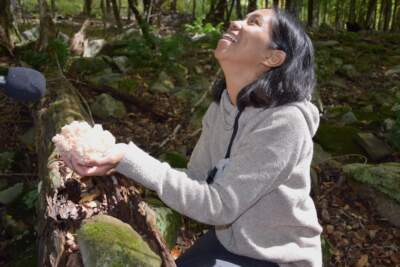
Ria: But I laugh a little bit. I left it a little bit, assuming it will grow again, maybe next year to the mycelium. And then here we are!
Amory and Megan: Yay!
Ria: Yeah.
Amory: Well, it's a testament to your philosophy.
Ben: Yeah.
Amory: That you shouldn't take all of it. You just take some of it.
Ben: Megan you should get a shot of that thing …
Ben: This is an important part of what Ria preaches in her work as a burgeoning forager influencer. Don’t just take everything you find on a foraging trip. Take what you need and leave some for the next person. Or for next year.
Amory: Another thing that Ria talks about a lot is how the foraging trend has some less great trends within it. People driving hundreds of miles in cars to forage. And yes, not everyone has a backyard. But if you do, don’t take a big long road trip, look at what’s growing in your own immediate area. Learn about your immediate ecosystem.
Ria: This is not an easy life, I would say. Like, it's a process is like many, like, see, like, like weather, noticing everything. But the reason why I share it because I want people to do it to. Like, not just as a hobby, but it is the way of living to help us a sustainable life. Like we don't need to buy produce from a big giant supermarket. But you can grow your own food. Or also you can go to farmer's market and support local farmers. Yeah, it is a little bit, you know, tricky in that way, but that's my, I guess, that's my intention. When I have social media, when I posted something, I want people to see it. This is the way of living beautifuly, naturally, like, like sustainably. But it is the process. This is my life. And you also can do it.
Amory: Ria has her own very large garden behind a homestead she’s building on land adjacent to Soul Fire Farm. And she’s also cultivating shiitake mushrooms, not just foraging for fungi.
Megan: Hawthorns!
Ben: Yeah.
Ria: Good for heart. Get the berries and you can make ketchup with it.
Ben: Ketchup? Really?
Ria: Yes!
Ben: Hawthorn ketchup, wow.
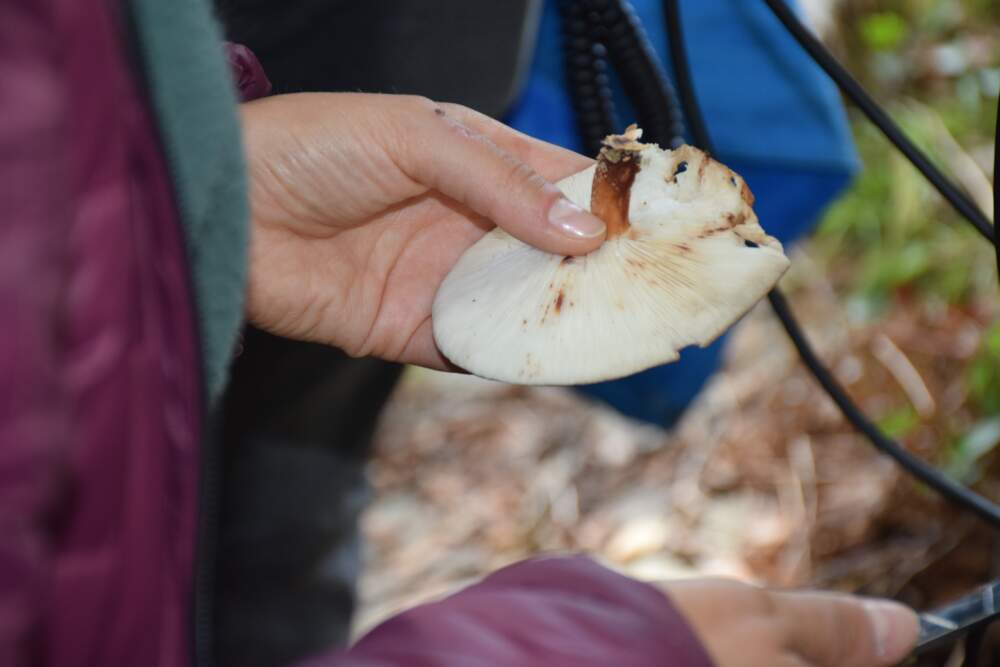
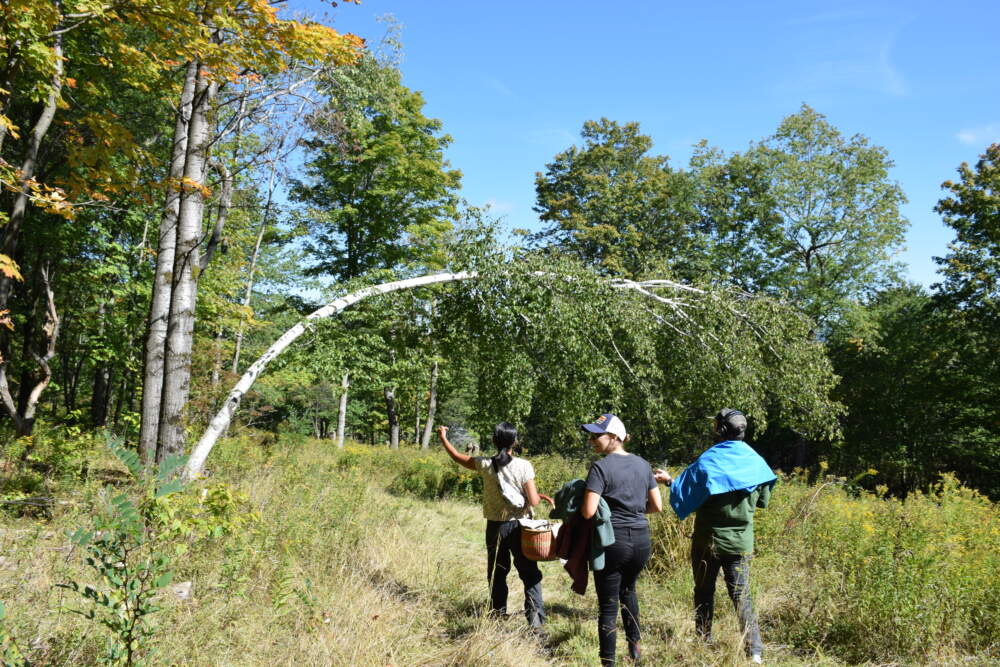
Amory: So we are coming back out of the woods to Soul Fire farm with not just turkey tail mushrooms, but a whole pile of pancake-sized shiitakes, and of course a big ol' clump of lions mane.
Ben: The farm’s educational orientation around farm-to-table food necessitates a pretty legit working kitchen just a few yards from its fields and hoop houses. Soul Fire brings in groups of people to work on and train on the farm every year learning how to pasture-raise livestock, grow vegetables, fruit, and of course forage mushrooms and medicinal plants on the farm’s 80 acres of land.
Amory: Soul Fire’s work and programs are focused on food sovereignty, on bringing people of color into farming education, not just as workers, but as owners and operators of farms around the country and the world. With this kind of ambition for changing the world ...
Ben: You need a lot of facilities. And the timber frame barn that holds the kitchen, built with recycled and reclaimed insulation, is spacious and full of ingredients.
(Pan frying sounds.)
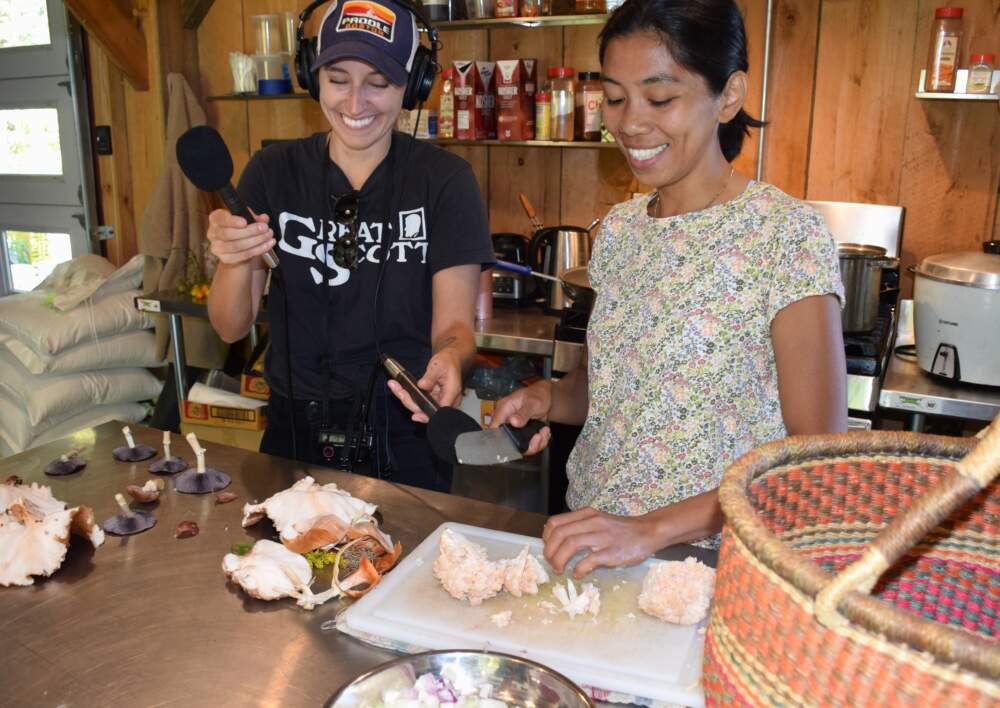
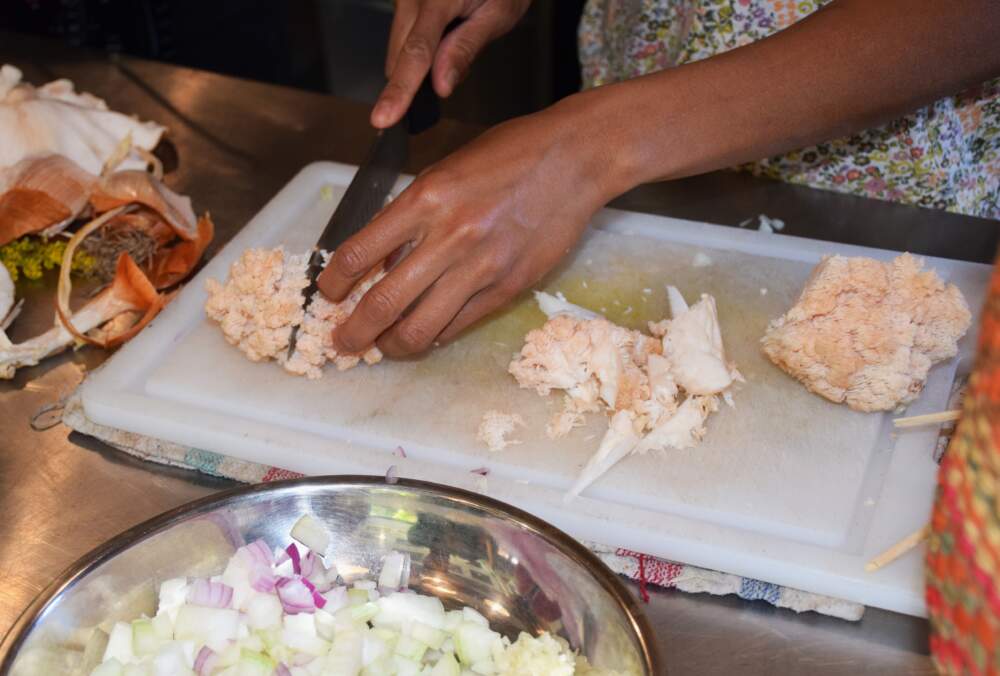
It only takes a few minutes from us walking out of the woods and into the barn for Ria to start cooking.
Ria: So I'm like, making the couscous. They're cooking it. And with just water and salt and saute this onion and olive oil. And add a little bit salt while I'm sauteing it, and then I'm getting the garlic. Onion has like, very sweet. So, like. There ya go. And with mushroom, like what we say before we want to clean it, but we don't want to wash it with water because it's consists of a lot of water in when we want to saute, I like it in high heat the first time to reduce the water first until like and then later to a very low medium to keep the texture.
Ben: You can tell Ria knows her stuff because already the meal smells amazing. Some other Soul Fire Farm folks have joined us to chop veggies and hang out.
Naima Penniman is the farm’s director of education and programming who has helped Ria and many other visitors get their bearings on foraging mushrooms that are delicious and not dangerous.
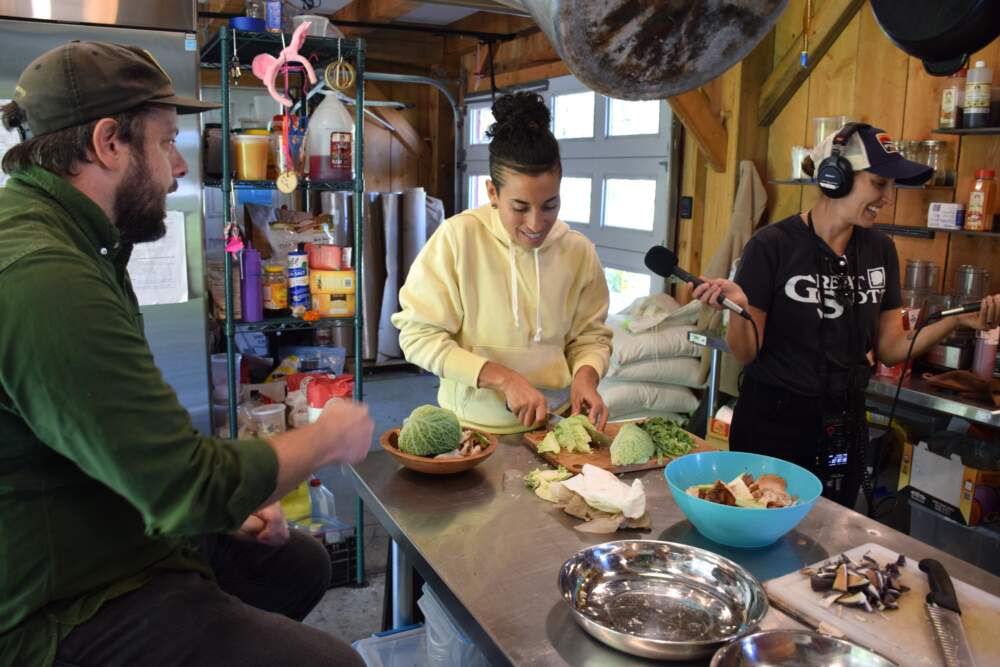
Naima Penniman: And then another way to identify when you're not sure it to take a spore print of the mushroom. Which is like a fingerprint that the that the mushroom gives off. And you can take a cap from your harvest, go home, put it under a glass or a bowl on paper, and see this four point drop. And the color of the spores gives you yet another clue if you're like it could be this, it could be that.
Amory: Our meal of mushrooms pulled from the woods and couscous pulled from the barn kitchen shelves is ready.
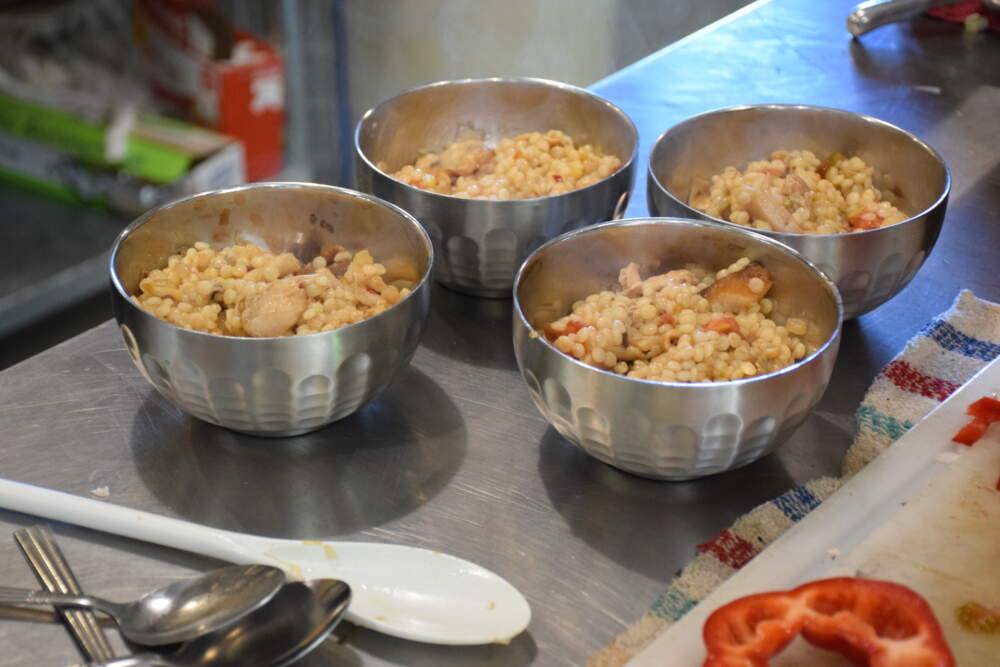
Ben: Beautiful
Amory: Amazing!
Ria: Yes, mari makan.
Ben: Thank you so much for sharing.
Amory: What does that mean?
Ria: Mari makan means, "let's eat!"
Ben: It is so good It might taste a little bit better…because we gathered some of the ingredients ourselves.
Amory: Maybe. We close our time with some thoughts on what kind of mushrooms we would be if we were mushrooms, like you do.
Naima: Lion's mane.
Amory: Why?
Naima: I feel. So delicate on the outside and then this immense amount of mass and so many healing properties. And they're beautiful to look at.
Amory: Also, this younger generation’s hopes for the impact of their work, in the forest, or in the fields.
Naima: So my prayer and vision in the world that I'm committed to co-creating affords all of us a sense of felt safety where we can, you know, go to bed feeling safe at night and move through our day without the threat of violence. I imagine us being in reciprocity with nature, you know, not seeing her as something separate, but seeing ourselves as part of this interdependent web in that our actions are. Contributing to this sense of a shared destiny as opposed to, you know, we go and just take what we need for ourselves and run, you know, for coming back into balance. Letting go of excess.
Ben: For Ria, who has been on a long journey from her hometown in Indonesia, who has had a city life and a very rural life it seems like she has reached her own treasure in the woods. She’s got a daughter and a lifestyle that fits her needs and her belief system for how to be in the world.
Ria: To me, like just being in community, like, feel safe. Like what I like echo what all that Naima says. But like, just like a simple, like everyone have their own task and responsibility. Being in the community, like my daughter, I want her to have healthy environment. I want her to feel like oh spring has many flowers blooming, like snow melting, it's not hot spring you know. I want that world for my daughter. And in her daughter and her granddaughter to be in this world and to feel safe.
[CREDITS]
Ben: This episode was produced by Megan Cattel and me, Ben Brock Johnson. It was co-hosted by mushroom banh mi freak Amory Sivertson and sound designed by consummate woodsman Paul Vaitkus.
Our Managing producer is Samata Joshi. The rest of our team includes Grace Tatter, Quincy Walters, Dean Russell, Nora Saks, Matt Reed and Emily Jankowski.
If you’ve got an untold history or an unsolved mystery you want us to tell, hit us up at endless underscore thread at wbur dot org. You can find photos of this adventure and more info about Soufire Firm and Ria at WBUR.org slash endless thread. You should also check out our subreddit, r/endless thread.
Our show is about the blurred lines between a lion’s mane and an influencer telling you to drive 300 miles. Later nerds.
